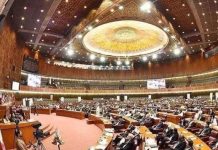ISLAMABAD, SEP 01 (DNA) — As Islamabad’s population continues to surge, the city’s natural resources are being pushed to their limits. Water scarcity has emerged as the most pressing challenge for the city’s authorities, with the Capital Development Authority (CDA) striving to manage the increasing demand.
Despite the CDA’s efforts, the situation requires a comprehensive approach to ensure long-term water security for the federal capital. Over the past two decades, Islamabad’s population has more than doubled, significantly increasing the pressure on existing water resources such as Simly, Rawal, and Khanpur dams.
The development of new housing societies to accommodate the influx of people from other cities has further exacerbated the problem. The depletion of underground water reserves and the effects of climate change have added to the growing concerns.
“The situation is challenging, but the CDA has initiated several measures to address the shortfall,” stated Sardar Khan Zimri, Director General of Water Management at the CDA. “With the population growth and emergence of new settlements, the increase in water demand is natural, and the Authority is fully cognizant of its duties.”
In response, the CDA has proposed constructing two new dams, Shahdra and Chiniot, to supplement the current water supply. To improve efficiency, the authority plans to modernize the water distribution network and upgrade sewage treatment plants, aiming to reduce water losses and enhance overall system effectiveness.
The CDA Board has approved pre-feasibility studies for the Shahdra and Chiniot dams to expedite planning and has requested the Water and Power Development Authority (WAPDA) to conduct a pre-feasibility study for the Dotara Dam, located 41 kilometres upstream of Khanpur Dam. “If we succeed in laying a gravity tunnel from Dotara Dam via Shahdara, it could generate around 10 to 13 megawatts of electricity as well,” Zimri noted. He also highlighted projects to enhance Khanpur Dam’s water storage capacity and address water theft and seepage issues, which result in a significant loss of the capital’s water share.
“The CDA has requested WAPDA to conduct pre-feasibility studies, and once Islamabad secures its due water share, we could supply water to at least 10 more sectors,” Zimri said.
The CDA also plans to resume work on the incomplete water conduction pipeline from Shah Allah Ditta reservoir to several city sectors, with tenders called for the remaining portions. Additionally, the CDA Board has approved amendments to building by-laws to encourage rooftop rainwater harvesting.
To ensure clean drinking water, the CDA has installed 94 filtration plants across Islamabad, monitored regularly for quality compliance with WHO standards. The CDA is also undertaking significant long-term projects, such as sourcing water from the Indus River System at Tarbela Dam for Islamabad and Rawalpindi.
This project aims to establish a reliable source of potable water to meet the growing demand of both cities. The increasing population has raised water demand to approximately 120 million gallons per day (MGD), and if this trend continues, the demand will further strain the available resources.
The groundwater table, which was around 10 meters deep in the 1960s, has now plummeted to depths of 60 to 120 meters. Climate change is also impacting water availability, with changing rainfall patterns contributing to the challenge, as the city’s annual average rainfall of about 1,300 mm is insufficient to meet the high demand.
Residents are calling for a comprehensive strategy to address the water crisis, emphasizing the need for timely action to secure a better future. “We need timely measures to ensure that our future generations live in a better environment with all required basic facilities,” said Maria, a concerned mother. Ahmed, another resident, stressed the urgency of the matter, urging the government to take immediate action.
Fatima, a businesswoman who has lived in Islamabad for 20 years, echoed these concerns. “Given the situation in recent years, I feel that it is high time for urgent measures,” she said.
While the CDA’s ongoing projects and proposed solutions are steps in the right direction, water conservation is a shared responsibility. Residents must also do their part by avoiding water wastage and using this vital resource responsibly. With no mechanism in place to control population growth, it is crucial for both civic agencies and residents to work together to ensure the uninterrupted provision of essential services in Islamabad. —DNA

















